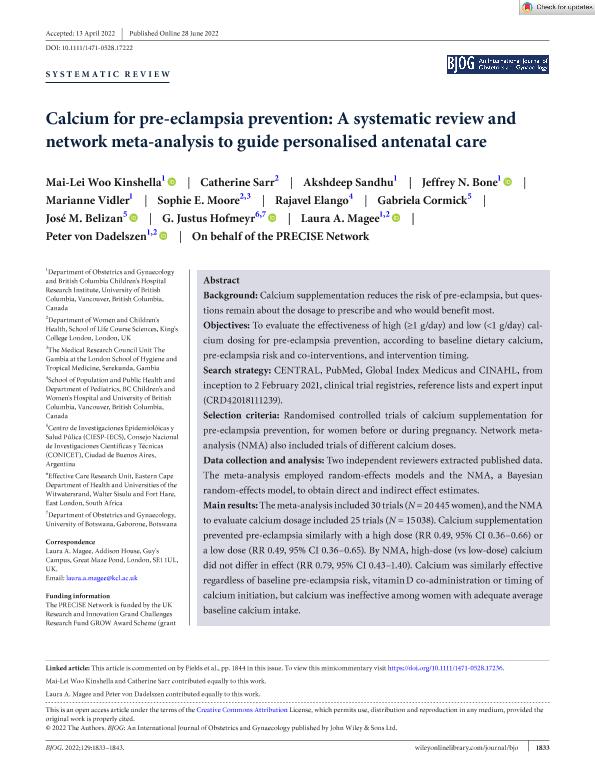Artículo
Calcium for pre-eclampsia prevention: A systematic review and network meta-analysis to guide personalised antenatal care
Woo Kinshella, Mai-Lei; Sarr, Catherine; Sandhu, Akshdeep; Bone, Jeffrey N.; Vidler, Marianne; Moore, Sophie E.; Elango, Rajavel; Cormick, Gabriela ; Belizan, Jose
; Belizan, Jose ; Hofmeyr, G. Justus; Magee, Laura A.; von Dadelszen, Peter
; Hofmeyr, G. Justus; Magee, Laura A.; von Dadelszen, Peter
 ; Belizan, Jose
; Belizan, Jose ; Hofmeyr, G. Justus; Magee, Laura A.; von Dadelszen, Peter
; Hofmeyr, G. Justus; Magee, Laura A.; von Dadelszen, Peter
Fecha de publicación:
05/2022
Editorial:
Wiley Blackwell Publishing, Inc
Revista:
BJOG - An International Journal of Obstetrics and Gynaecology
ISSN:
1470-0328
Idioma:
Inglés
Tipo de recurso:
Artículo publicado
Clasificación temática:
Resumen
Background: Calcium supplementation reduces the risk of pre-eclampsia, but questions remain about the dosage to prescribe and who would benefit most. Objectives: To evaluate the effectiveness of high (≥1 g/day) and low (<1 g/day) calcium dosing for pre-eclampsia prevention, according to baseline dietary calcium, pre-eclampsia risk and co-interventions, and intervention timing. Search strategy: CENTRAL, PubMed, Global Index Medicus and CINAHL, from inception to 2 February 2021, clinical trial registries, reference lists and expert input (CRD42018111239). Selection criteria: Randomised controlled trials of calcium supplementation for pre-eclampsia prevention, for women before or during pregnancy. Network meta-analysis (NMA) also included trials of different calcium doses. Data collection and analysis: Two independent reviewers extracted published data. The meta-analysis employed random-effects models and the NMA, a Bayesian random-effects model, to obtain direct and indirect effect estimates. Main results: The meta-analysis included 30 trials (N = 20 445 women), and the NMA to evaluate calcium dosage included 25 trials (N = 15 038). Calcium supplementation prevented pre-eclampsia similarly with a high dose (RR 0.49, 95% CI 0.36–0.66) or a low dose (RR 0.49, 95% CI 0.36–0.65). By NMA, high-dose (vs low-dose) calcium did not differ in effect (RR 0.79, 95% CI 0.43–1.40). Calcium was similarly effective regardless of baseline pre-eclampsia risk, vitamin D co-administration or timing of calcium initiation, but calcium was ineffective among women with adequate average baseline calcium intake. Conclusions: Low- and high-dose calcium supplementation are effective for pre-eclampsia prevention in women with low calcium intake. This has implications for population-level implementation where dietary calcium is low, and targeted implementation where average intake is adequate. Tweetable abstract: A network meta-analysis of 25 trials found that low-dose calcium supplementation (<1 g/day) is as effective as high-dose calcium supplementation (≥1 g/day) in halving the risk of pre-eclampsia when baseline calcium intake is low.
Archivos asociados
Licencia
Identificadores
Colecciones
Articulos(CIESP)
Articulos de CENTRO DE INVESTIGACIONES EN EPIDEMIOLOGIA Y SALUD PUBLICA
Articulos de CENTRO DE INVESTIGACIONES EN EPIDEMIOLOGIA Y SALUD PUBLICA
Citación
Woo Kinshella, Mai-Lei; Sarr, Catherine; Sandhu, Akshdeep; Bone, Jeffrey N.; Vidler, Marianne; et al.; Calcium for pre-eclampsia prevention: A systematic review and network meta-analysis to guide personalised antenatal care; Wiley Blackwell Publishing, Inc; BJOG - An International Journal of Obstetrics and Gynaecology; 129; 11; 5-2022; 1833-1843
Compartir
Altmétricas



